EDITOR’S NOTE: For the overview of the Tumbleweeds festival, see The Utah Review cover piece here.
Taking advantage of the first Tumbleweeds festival to be held over two weekends, the Utah Film Center has programmed one of the most impressive slates of feature- and short-length films in the event’s nine-year history. The Utah Review also has screened several of the films in advance.
TUMBLEWEEDS 2020 FESTIVAL SLATE
The Prince’s Voyage (Le Voyage du Prince) (Jean-François Laguionie and Xavier Picard, France/Luxembourg, French with English subtitles, ages 6+) – March 6, 7 p.m.; March 13, 6:30 p.m.
This truly is the perfect opener for an international kids’ film festival that aspires to distinction in programming for its targeted audience. The world of French animation stands out not just for its technical execution but also its meticulous dedication to richly layered storytelling. This fantasy tale offers many epiphanies, as the director has replaced different human cultures and groups with those of simian species, represented here by the Laantos and Niokous.
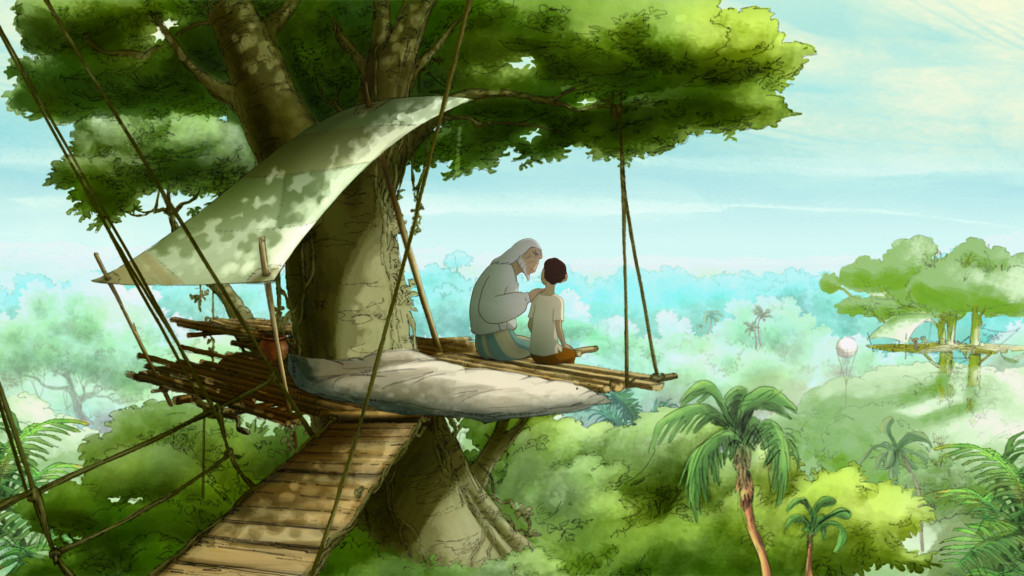
Prince Laurent has traveled from Laantos and ends up stranded on the shores of the Niokous land. He becomes the subject of extensive scientific examination by a researcher who hopes to rehabilitate his professional standing among his peers. Professor Abervrach believes he will restore his reputation by presenting the Prince as evidence of his theories that other groups exist outside of Niokous. Tom takes the Prince on an excursion, where he tells his new friend about life in the city, experience the Festival of Fear which seems like a more sinister version of Mardi Gras or Carnaval, and they circle back into the jungle on a trolley car. The Prince realizes that Niokous is an obsessively regulated world and with Tom, they plan their escape.
The themes of freedom of expression, bigotry, racism, the human imprint on nature and environment and the lifelong desire to explore boundaries and new vistas for learning and invention are synthesized intricately without letting any single aspect distract from the main story’s clarity and the fully fleshed out personalities of the characters. This is a treat for both young viewers and adults. The film is a continuation of a 1999 story from the director: A Monkey’s Tale (Le château des singes).
While there are echoes of The Planet of The Apes story franchise in some elements along with Tarzan and a wonderful bit echoing King Kong, the film evokes a unique 19th century feel, purity and earnestness that nevertheless seems acutely relevant and timeless, even when pitched against its Victorian Era setting. The animation is warm with pastels, richly detailed landscapes and a softness that evokes the characters not merely as protagonists or antagonists but as complex, conflicted beings who respond to the ethical and moral concerns they confront. The effusive orchestral score caps the visionary vibe of this special film.
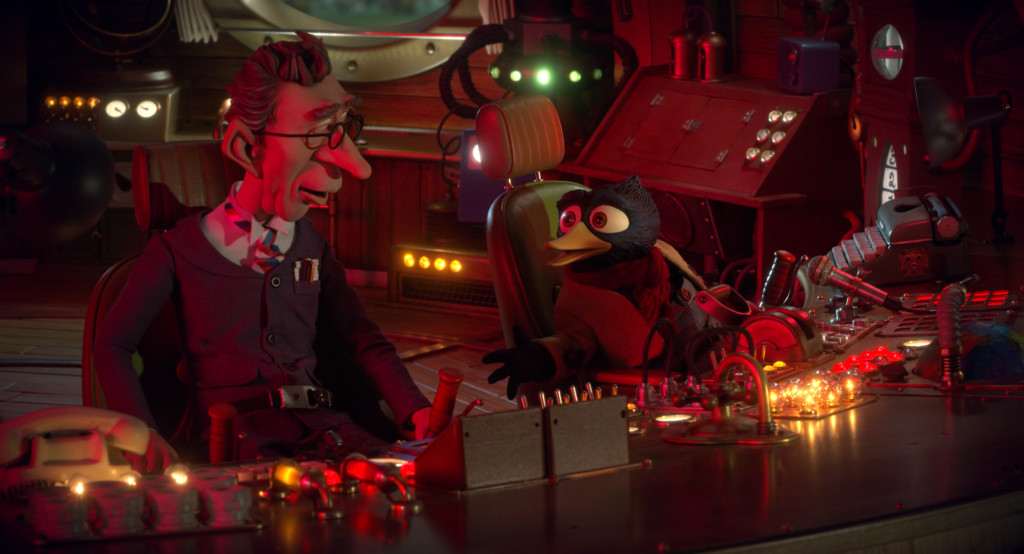
Louis and Luca: Mission to the Moon (Månelyst i Flåklypa) (Rasmus A. Siversten, Norway, dubbed in English and Spanish versions, ages 4+) – March 7, 11:30 a.m. (English version); March 15, 11:15 a.m. (Spanish version).
As with last year’s presentation of another film in the Louis and Luca series (Louis and Luca – The Big Cheese Race), this is a perfect family selection for a weekend morning presentation. The witty stories highlight Louis, a proud magpie, and Luca, the incessantly nervous hedgehog, as rendered in high-quality stop-motion animation that wisely balances digital and traditional techniques.
Rocca Changes the World (Rocca verändert die Welt)(Katja Benrath, Germany, German with English subtitles, ages 8+) – March 7, 1:45 p.m.
Hilly Martinek, author of Honey in the Head, based the screenplay for this film on the fictional character of Pippi Longstocking. Rocca, whose mother has died, is staying with her grandmother while her father is on a space mission. When her grandmother is sent to the hospital, Rocca’s circumstances change, especially when she arrives at her new school. The film, which emphasizes a positive theme about self-confidence and affirmation of children from diverse backgrounds, has won at least two awards in international film festivals.
Too Far Away (Zu weit weg) (Sarah Winkenstette, Germany, German with English subtitles, ages 8+) – March 7, 4:15 p.m.
The film highlights the new friendship between Ben, a German boy who is not happy about his family moving to a new city for work, and Tariq, a refugee from Aleppo who was separated from his family when they fled Syria. Both boys share a talent for soccer and they are competitive but the boys also learn about each other, realizing that they share more than just a love for their beloved sport. The film won honors in the teen screening competition at the Molodist International Film Festival in Kyiv.
H is For Happiness (John Sheedy, Australia, ages 10+) – March 7, 6:30 p.m.; March 15, 4 p.m.
Candice, a talented student who is trying to cope with the dysfunctions that threaten to separate her family, makes friends with Douglas, a new boy at her school. Her positive attitude underlies her determination to reconcile problems in her closest relationships. The film won finalist honors at the 2019 Cinefest Oz.

The Lunnis and the Great Fairy Tale Adventures (La Gran Aventura de Los Lunnis y el Libro Mágico) (Juan Pablo Buscarini, Spain, Spanish with English subtitles, ages 4+) – March 8, 9:30 a.m.; March 13, 4 p.m.
In 2004, the Spanish television equivalent of Sesame Street debuted with The Lunnis. This film resonates with dynamic imagination supported by actors, puppets and songs, featuring Mar, 8, a girl who thrives on the classics of children’s fantasy and literature, as read by her grandfather. Her interpretations lead to real adventures. The film received honors for its orchestral score at the 2019 Spanish Audiovisual Awards.
The Elfkins – Baking a Difference (Die Heinzels – Rückkehr der Heinzelmännchen) (Ute von Münchow-Pohl, Germany, English, ages 4+) – March 8, 1:45 p.m., March 14, 11:30 a.m.
The film updates a popular fairy tale told through the verses of the 19th century painter and poet August Kopisch, and infuses it with fresh relatable characters and the contemporary debate about quality craft skills and automation. And, the setting is a pastry shop.

I Used to Like the Sea (Je N’aime Plus La Mer) (Idriss Gabel, Belgium, French and Arabic with English subtitles, ages 8+) – March 8, 3:45 p.m.
This documentary, which won honors at the European Children’s Film Association, provides a unique perspective from young refugees from Afghanistan, Iraq, Syria and Eritrea – all of whom are roughly the same age as many Tumbleweeds viewers. Their stories chronicle difficult, uncertain and turbulent episodes and their fresh memories of the sea during their migration journeys are so pervasive that they cannot recapture imagining the pleasures or excitement that many children typically experience when they go to the beach. And, for some that uncertainty remains, as they wonder if their families will be able to stay in Belgium and rebuild their lives.
While they appreciate the assistance they have received at the Red Cross center, they miss the experiences of a familiar community and wonder if they will be able to establish the roots where they can feel comfortable and are accepted as friends. Gabel’s film is marvelous for emphasizing the importance of listening to young refugees and how one can make the conscious effort to cultivate and nourish empathy and bridge divides to young newcomers in their neighborhoods and communities.
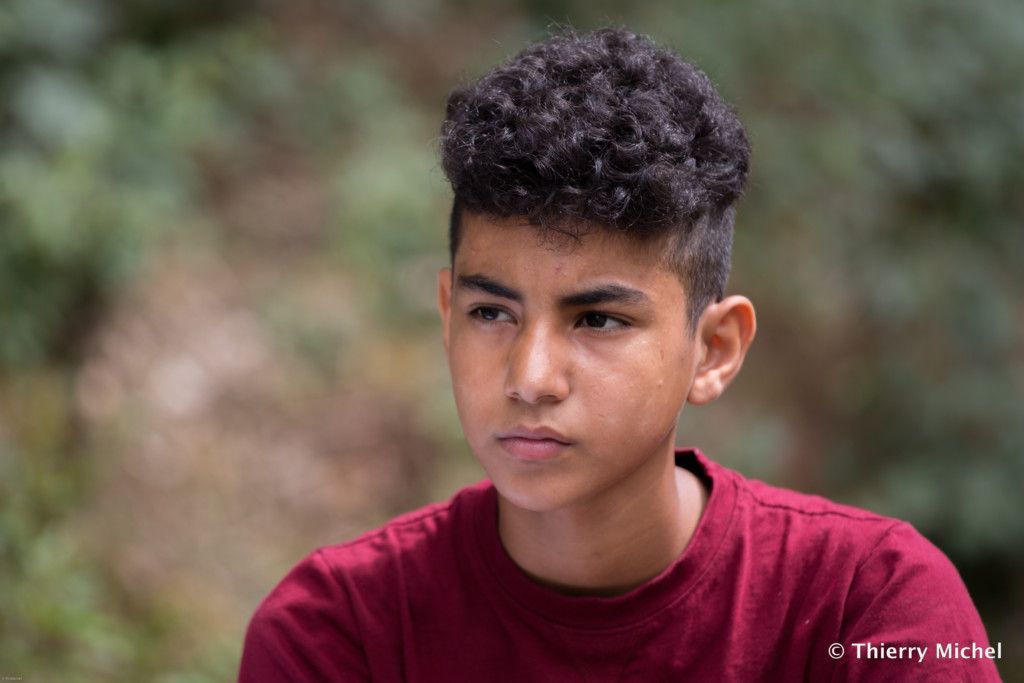
The Club of Ugly Children (De Club van Lelijke Kinderen) (Jonathan Elbers, Netherlands, Dutch with English subtitles, ages 10+) – March 8, 5:45 p.m.
A fascinating exploration of a disturbing world that unfortunately has become familiar in the current news landscape, as children rebel against an authoritarian leader who decides that children who look different must be deported. The film is inspired by a classic Dutch children’s book written in the 1980s by Koos Meinderts, which also has been adapted into a play, musical and short film.
The House of Us (Woori-jip) (Ga-yeun Hoon, Korea, Korean with English subtitles, ages 8+) – March 14, 1:45 p.m.
The spotlight on South Korean cinema has magnified considerably since Parasite won four of the top Academy Awards honors, including Best Picture. Many Americans are just beginning to discover just how expansive the artistic standards of cinematic excellence are in the Korean film industry. A magnificent delight in sincere, unvarnished storytelling that offers a solid, credible portrait of childhood, The House of Us shines as an accessible example for young Tumbleweeds viewers.
The young actors carry the film’s storyline with a polished craft. In the film, which is a follow-up to the director’s 2016 The World of Us, the story of Hana, who is ready to enter her teen years, is exasperated that she is unable to end the quarrels between her parents which threaten to split them for good. It’s summer vacation and Hana becomes friends with two younger girls: Yoo Mi and Yoo Jin. The younger girls are living in a rented house, while their mother is far away on a work assignment in Bora Beach. Hana is hoping that she can convince her family to go on a beach trip, believing that it will bring everyone closer. Frustrated by the happenings at home, Hana instead organizes a trip for her new friends to find their mother in the area near Bora Beach.

These circumstances about family tensions will ring familiarly for many children of the same age as Hana, Yoo Mi and Yoo Jin. The story’s authentic unpretentiousness makes The House of Us as delightful as it is substantive in its dramatic elements. These are kids with whom anyone can identify, regardless of culture or location.
Romy’s Salon (Kapsalon Romy) (Mischa Kamp, Netherlands/Germany, Dutch, Danish, and German with English subtitles, ages 8+) – March 14, 4 p.m.
Romy, 10, is not thrilled about being watched by her grandmother who is busy with her hair salon and is annoyed by her granddaughter getting in the way. However, the relationship between the two changes in a more loving way, when Romy discovers that her grandmother is showing signs of Alzheimer’s Disease. The film has won at least a dozen major film festival awards, including Best Feature Film for Children honors at the Ale Kino! – International Young Audience Film Festival.
Giving Voice (James D. Stern and Fernando Villena, U.S., ages 12+) – March 14, 6:30 p.m.
A highly recommended reprise after its premiere at Sundance in January, this film is an outstanding uplifting documentary, which won the Festival Favorite Award. A particularly memorable passage is the beautiful string of excerpts from the young actors who are performing in the finals of the August Wilson Monologue Competition on a Broadway stage. Their performances are so compelling. It is a stellar moment to appreciate how a playwright’s legacy is being sustained with the passion of youth who see Wilson’s work as a pillar in their formative education and motivations for developing their passions as careers.
Many of the competitors were just infants when Wilson died in 2005 from liver cancer. A Pittsburgh native, he received many honors in his career, including two Pulitzer Prizes and two Tony Awards. Among his most widely known works is a series of 10 plays, the Pittsburgh Cycle, each set in a different decade of the 20th century. More recent audiences will recognize his work in the 2016 film Fences, produced and directed by Denzel Washington, who appears in Giving Voice along with actor Viola Davis. This documentary chronicles the meaning and impact of Wilson’s body of work for a new generation of actors.

Marona’s Fantastic Tale (L’extraordinaire voyage de Marona) (Anca Damian, France, French with English subtitles, ages 12+) – March 15, 6:30 p.m.
Wise choice to have two stellar animation features from France as bookends for Tumbleweeds. As with the opener The Prince’s Voyage, this film dazzles in rendering a multi-layered story with pure grace and elegance as well as respect for its intended audience of young viewers. Marona is a mixed-breed Labrador and this intriguing story tells the episodes of her life in flashbacks. It is a touching tale told with vibrant colors and choreographed graphics representing the three humans this special dog has had in her life. In each instance, she has had a different name, but she also experiences the exhilaration and disappointment with her human friends. Marona realizes the painful inevitability that her unconditional love and loyalty will end up short on the rewards, thanks to the character flaws of the humans in her life.
Despite its seriousness, this is a genuinely playful romp, with Damian’s story rendered spectacularly by animation artist Brecht Evens from Belgium. Damian, who is from Romania, is an extraordinary filmmaker in the animation genre and her film has been picked up for North American distribution by GKIDS. The film has won at least four honors at European film festivals.

TUMBLEWEEDS FREE, PUBLIC SCREENINGS
2019 Amazing Animation Shorts Program – March 6, 10 a.m.
A selection of 12 animated short films that were presented at last year’s festival.
Supa Modo (Likarion Wainaina, Kenya, Swahili with English subtitles, ages 8+) –March 6, 2:30 p.m.
The opening film for the 2019 Tumbleweeds festival, Supa Modo is highly recommended for young audiences. At nine years old, Jo is obsessed with superheroes but her remaining time is short because of a terminal illness. Jo’s dreams about superhero stories run deep and her older sister Mwix concocts a way for her to play out her dreams with as much conviction and credibility as can be mustered. The community joins Mwix’s efforts and they start making a film about Jo’s staged superhero adventures.
In Supa Modo, Wainaina goes deeper, relying on the terminally ill children he met at Kenyatta National Hospital in Nairobi. He had asked the children to write their wishes on a slip of paper, and all of them would be read anonymously as a group the next time they met. It was a shy boy’s wish that transformed Supa Modo’s narrative development. As he recalls, “All this young child wanted was a helicopter, more Chapatis and for his mum to be happy. You see this brave young soul already knew he won’t live long. He just wanted his mother to be happy… Her sadness was the only thing he couldn’t live with.”
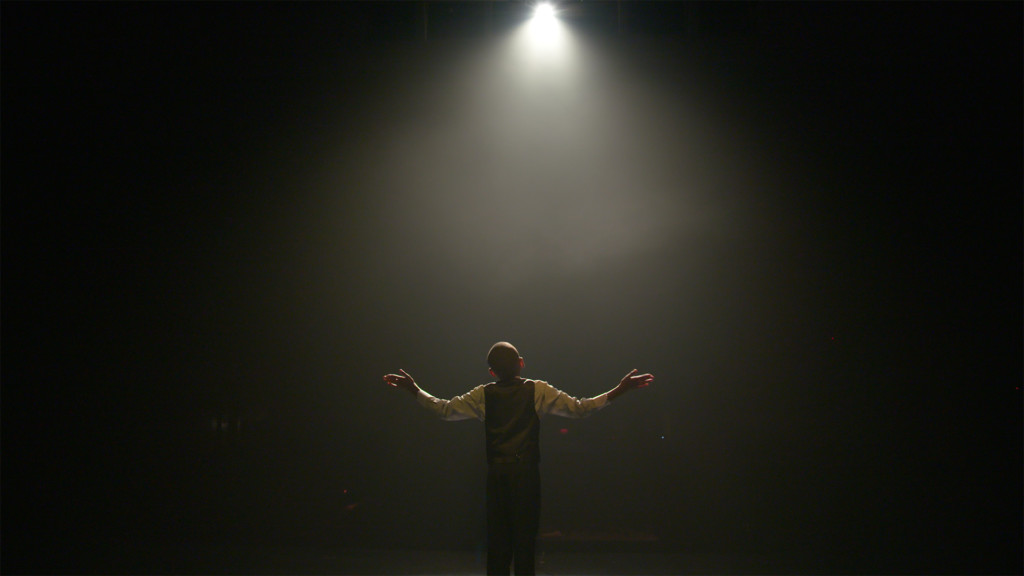
We Are the Dream: The Kids of the Oakland MLK Oratorical Fest (Amy Schatz, U.S., ages 8+) – March 10, 7 p.m.
This documentary is recommended as a companion piece to this year’s festival screening of Giving Voice, a film about a monologue competition based on the works of the playwright August Wilson, which premiered at Sundance in January. Schatz, an Emmy Award winning director who collaborated with executive producer Mahershala Ali, Academy Award winning actor, chronicles the progress of students in Oakland, California as they prepare for the 40th annual MLK Oratorical Festival.
Anbessa (Mo Scarpelli, Ethiopia, Italy, U.S., Amharic with English subtitles, ages 10+) – March 11, 7 p.m.
The award-winning film, which premiered at the 2019 Berlinale, follows Asalif, a 10-year-old boy with an unquenchable motivation to explore his curiosity as an inventive maker, as he fashions lamps, torches and small motor-powered toys from materials he finds in scrap heaps surrounding his village. Scarpelli, who is known for Frame by Frame (a documentary about four Afghan photojournalists trying to exercise their rights for a free press which was a highlight at 2015’s SXSW), situates Asalif’s story in the context of a country being changed by urban development and westernized interests. The title comes from the Amharic word for lion.
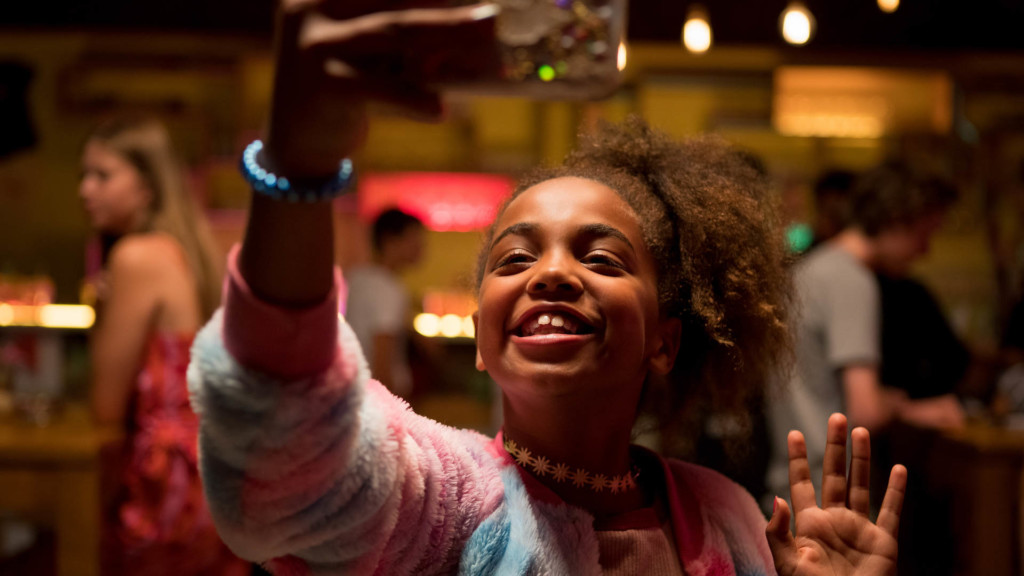
Binti (Frederike Migom, Belgium/The Netherlands/Germany, Dutch with English subtitles, ages 8+) –March 12, 7 p.m.
Fresh from its U.S. premiere in this year’s Sundance Kids slate, this feature-length narrative nicely supplements the 2020 festival screening of Je N’aime Plus La Mer (I Used to Like the Sea), the documentary about young refugees and their families from Afghanistan, Iraq, Syria and Eritrea, who are now in Belgium.
Binti, 12, a vivacious, budding social media entrepreneur hoping to find fame as a vlogger, lives in Belgium with her father, Jovial, who came from the Democratic Republic of the Congo, but does not have the proper, updated documents to stay in the country. Binti is careful about what she posts online in her videos, knowing that immigration authorities could recognize the location and raid their crowded apartment where she and her father stay with other migrants. Such a raid occurs early in the film. The two barely escape and find temporary refuge in a nearby wooded area. Binti meets and befriends Élias, a young lad who struggles with accepting his parents’ divorce. Eventually, Binti and Jovial meet Élias’ mother, which inspires the young migrant girl to concoct a plan for her father and the boy’s mother to fall in love and marry so they can stay in the country.
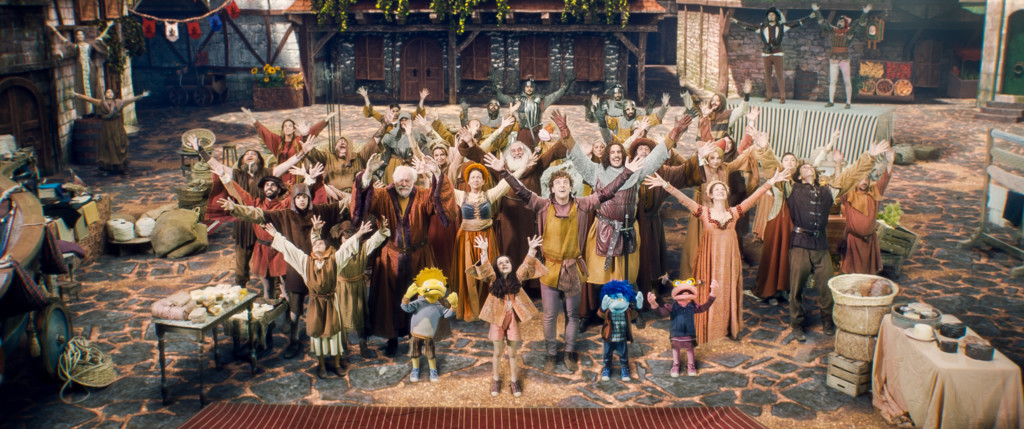
As The Utah Review noted from the film’s Sundance screening, for a film recommended for children ages 8 and up, Migom achieves a balance in a story with serious implications that nevertheless inspires plenty of delightful, charming and cute moments while enlightening its audiences to consider what migrants, refugees and immigrants face in communities around the world. The line of “you live but you don’t exist” concisely sums up the dilemma Binti and her father, who aspires to publish his poetry, attempt to resolve. And, Binti has lived nearly all of her formative years in Belgium, not the Congo.
12 Minutes Max –March 15, 2 p.m. In conjunction with the 2020 festival, the City Library’s monthly 12 Minutes Max series, featuring short works by local artists, will present three original pieces in a varied mix, specially designed for children (ages 6+) and their families.
For tickets, passes and more information about Tumbleweeds, see the Utah Film Center website.
